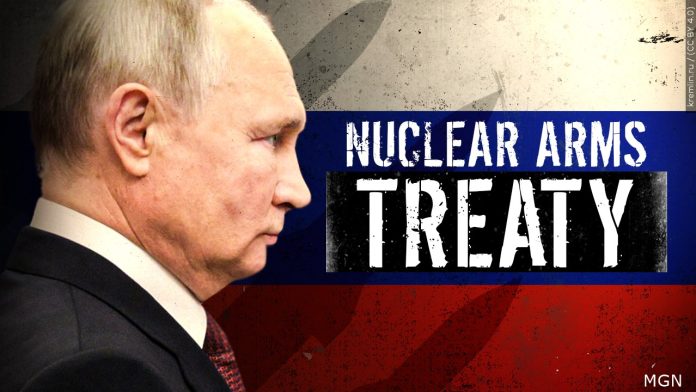Russian lawmakers on Wednesday unanimously approved the suspension of Moscow’s participation in the New START arms treaty, which President Vladimir Putin announced a day earlier.
New START, the last nuclear arms control pact between Russia and the United States, commits them to limiting their stockpile of nuclear warheads.
The backing by both chambers of Russia’s parliament, reported by state news agencies, came as no surprise after Putin’s announcement.
In his nearly two-hour speech Tuesday, the Russian leader accused the United States of “developing new types of nuclear weapons”.
Later the same day, the foreign ministry said it would still comply with the treaty until it expired in early 2026.
Russia’s decision to suspend the treaty was “reversible” — but Washington “must show political will”, it added.
Kremlin spokesman Dmitry Peskov said a return to the treaty would “depend on the West’s position”.
“NATO maintains its openly hostile position towards our country, not only in words, but also in actions…,” he said.
“Once there is a willingness to take into account our concerns, then the situation will change.”
Putin’s announcement was met with widespread international condemnation Tuesday.
US Secretary of State Antony Blinken said Russia’s decision was “deeply unfortunate and irresponsible” but that Washington was still willing to talk about the issue.
NATO Secretary General Jens Stoltenberg said the move meant that “the whole arms control architecture has been dismantled”.
It was earlier reported that, Russian President Vladimir Putin said he is suspending his country’s participation in the New START nuclear arms reduction treaty with the United States, imperiling the last remaining pact that regulates the world’s two largest nuclear arsenals.
Putin made the declaration in his much-delayed annual state of the nation address to Russia’s National Assembly on Tuesday.
Hours after Putin’s speech, Russia’s Foreign Ministry said the decision to suspend participation in the treaty was “reversible.”
The treaty puts limits on the number of deployed intercontinental-range nuclear weapons that both the US and Russia can have. It was last extended in early 2021 for five years, meaning the two sides would soon need to begin negotiating on another arms control agreement.
Under the key nuclear arms control treaty, both the United States and Russia are permitted to conduct inspections of each other’s weapons sites, though inspections had been halted since 2020 due to the Covid-19 pandemic.
While Russia is not withdrawing from the pact completely, it appears to be formalizing its current position. For months, US officials have been frustrated over Russia’s lack of co-operation with the agreement.
US Secretary of State Antony Blinken called Putin’s decision “deeply unfortunate and irresponsible.”
Blinken said President Joe Biden’s administration remains ready to talk about the nuclear arms treaty “at any time with Russia, irrespective of anything else going on in the world.”
He was joined by other Western allies, like France and the United Kingdom, which called on Putin to reverse the suspension. A spokesperson for British Prime Minister Rishi Sunak told CNN that Britain hopes Putin will “reconsider his rash decision.”
In a lengthy statement published on its website, Russia’s Foreign Ministry said the decision to suspend participation in the treaty is “reversible,” saying that ” Washington must show political will, make conscientious efforts for a general de-escalation and create conditions for the resumption of the full functioning of the Treaty and, accordingly, comprehensively ensuring its viability.”
The ministry urged “the American side to do just that. Until then, any of our steps towards Washington in the context of START are absolutely out of the question.”
The ministry goes on to say that Moscow calls on the United States “to refrain from steps that could prevent the resumption of the New START in the event that the necessary conditions for this mature.”
It also said that it would respect the nuclear weapons caps established under the treaty.
According to US officials, Russia had already refused on numerous occasions to allow inspections of its nuclear facilities. “Russia is not complying with its obligation under the New START Treaty to facilitate inspection activities on its territory,” a US State Department spokesperson said in January.
“Russia’s refusal to facilitate inspection activities prevents the United States from exercising important rights under the treaty and threatens the viability of US-Russian nuclear arms control,” the spokesperson said.
A session of the Bilateral Consultative Commission on the treaty was slated to meet in Egypt in late November but was abruptly called off. The US has blamed Russia for this postponement, with a State Department spokesperson saying the decision was made “unilaterally” by Russia.
The latest development announced by Putin “puts (the) treaty on life support,” Hans Kristensen, the Director of the Nuclear Information Project, wrote on Twitter, questioning whether Russia will now stop exchanging data with US counterparts.
Putin’s nuclear saber rattling during the war has alarmed the US and its allies, though officials have repeatedly dismissed the moves as empty threats.
In December, Putin warned of the “increasing” threat of nuclear war, and this month, Dmitry Medvedev, deputy head of Russia’s Security Council, threatened that Russia losing the war could “provoke the outbreak of a nuclear war.”
“Nuclear powers do not lose major conflicts on which their fate depends,” Medvedev wrote in a Telegram post. “This should be obvious to anyone. Even to a Western politician who has retained at least some trace of intelligence.”
And though a US intelligence assessment in November suggested that Russian military officials discussed under what circumstances Russia would use a tactical nuclear weapon in Ukraine, the US has not seen any evidence that Putin has decided to take the drastic step of using one, officials told CNN.













